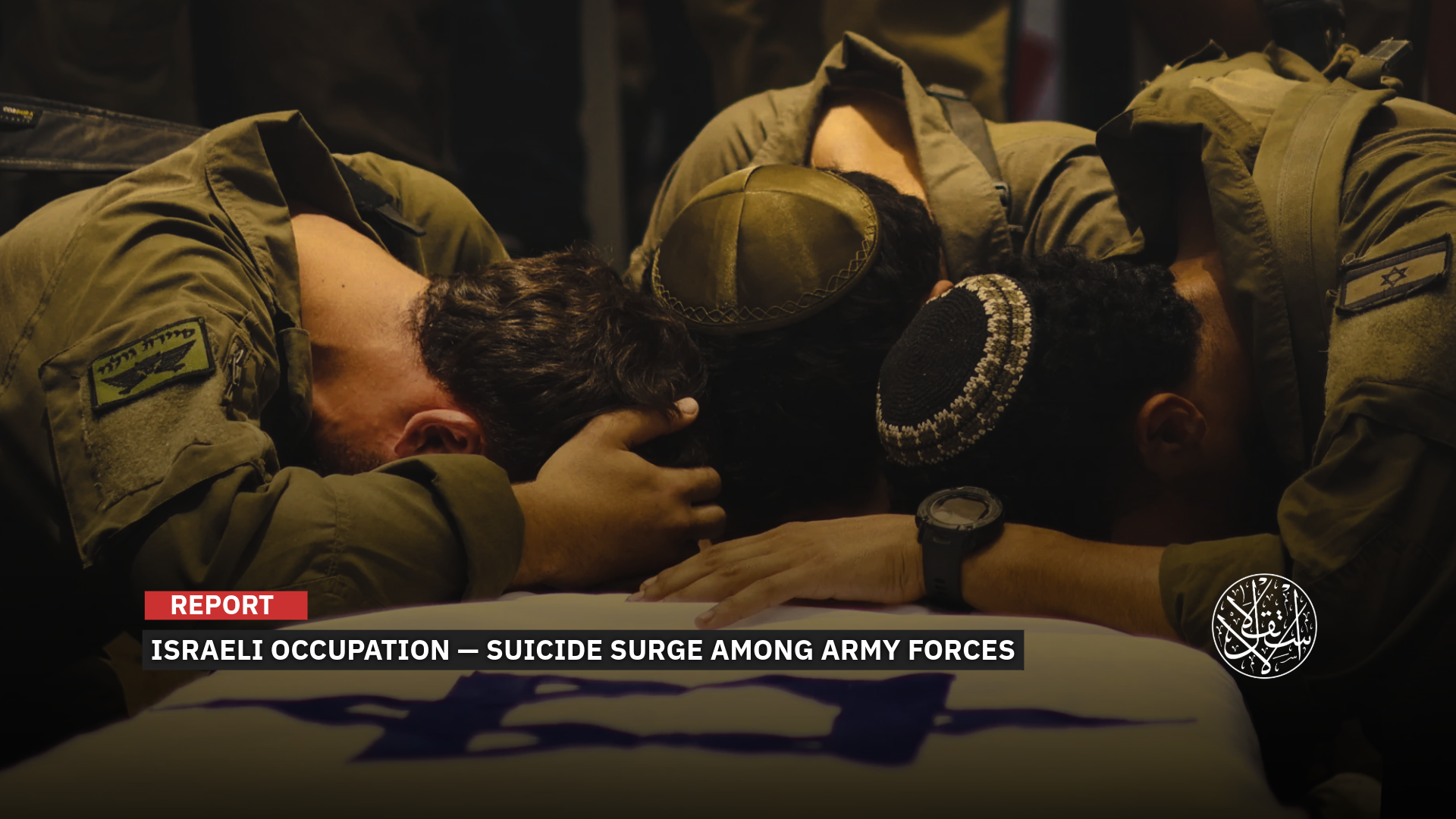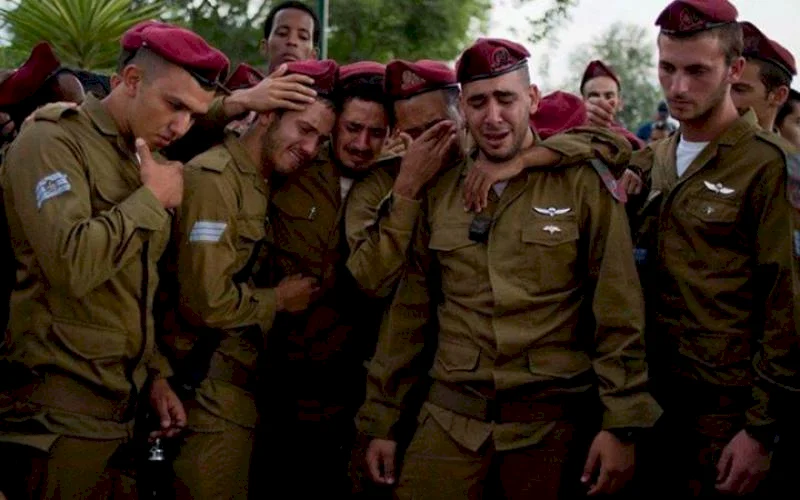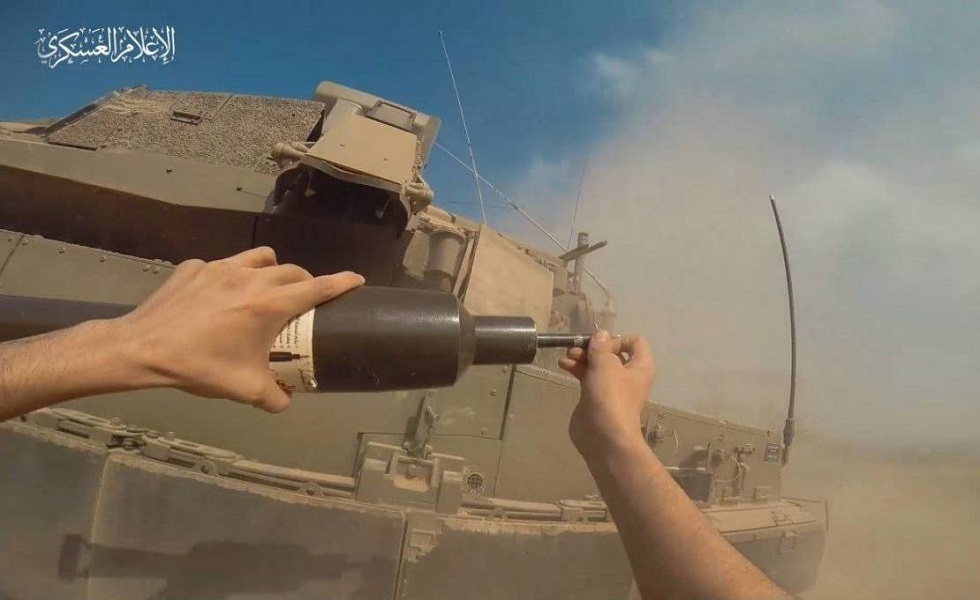Even on Their Wedding Days: Why Israeli Occupation Soldiers End Their Lives After Facing the Resistance

The army is working to downplay the psychological crisis among its ranks in order to preserve an image of cohesion.
Suicides among Israeli Occupation soldiers have become disturbingly routine, with growing acknowledgment inside Israeli society that the army is facing an unprecedented psychological and moral collapse.
The war on Gaza, now entering its third year, has left tens of thousands of Israeli troops with lasting physical, psychological, and cognitive wounds, crushing morale across the ranks. Israeli Occupation soldiers face unrelenting combat from Palestinian Resistance fighters, and the army itself admits that every time it re-enters an area it previously withdrew from, it encounters fierce resistance as if it had never invaded it before.
The relentless fighting and daily resistance operations have translated into mounting psychological pressure on soldiers, leaving scars that endure long after the war and, in many cases, end in suicide.
On September 9, 2025, Israeli Occupation medics found a 31-year-old reservist dead by suicide in his home in Rehovot, south of Tel Aviv, on what was meant to be his wedding day. The Israeli daily Maariv reported that he had been scheduled to marry that evening, calling the case part of a “disturbing rise” in suicides across the army.
Record Numbers
The Israeli Occupation army is now facing record suicide rates. The deteriorating psychological and moral state of its soldiers is not only undermining “Israel’s” military capacity but also fueling social and political instability. Families of soldiers have taken to protest, calling on troops to refuse service in what they see as a war launched only to secure Prime Minister Benjamin Netanyahu’s political survival.
Both official and unofficial data point to a sharp spike in suicides since the war began. According to “Israel’s” public broadcaster KAN, more than 57 Israeli soldiers have died by suicide between October 2023 and September 2025. Sixteen of those deaths occurred in 2025 alone, an unprecedented figure that highlights the scale of the crisis.
At the same time, over 26,000 Israeli Occupation soldiers have developed psychological disabilities linked to their wartime service, including about 11,000 diagnosed with post-traumatic stress disorder (PTSD). More than 10,000 are currently undergoing psychological treatment, and 90 have been discharged from the army due to mental health problems.
In response, the Israeli military has expanded its mental health corps, adding 200 officers for active-duty soldiers and 600 for reservists, according to Maariv, in an attempt to contain a crisis that shows no signs of easing.

Shocking Scenes
Since the start of the genocide on Gaza, Israeli Occupation soldiers have endured harrowing battles and ambushes: point-blank firefights, buildings collapsing while they were still inside, sniper fire, mortar attacks, minefields, tank and vehicle strikes with crews still aboard, tunnel warfare, combat inside destroyed buildings, and repeated attempts at capture.
In a July 2025 investigation, the Hebrew outlet Walla reported that these experiences have left long-term scars on soldiers’ mental health, including post-traumatic stress disorder (PTSD), chronic anxiety, and suicidal thoughts.
In some cases, the psychological strain has led to shocking outbursts. One paratrooper, jolted awake from a nightmare in which he saw Hamas fighters, opened fire on his comrades while screaming “terrorist, terrorist,” injuring one of them, a moment that starkly illustrated the depth of the trauma gripping soldiers.
Experts say the prolonged nature of the war on Gaza, the lack of any clear end in sight, and the intensity of the combat are driving factors in the crisis. Reservists called up from civilian jobs in education, health, and commerce have found themselves thrust into a brutal battlefield they were neither mentally nor physically prepared for, facing death daily in an environment riddled with tunnels, mines, and ambushes.
Professor Eyal Fruchter, former head of the Israeli Occupation Forces Mental Health Department and chair of the National Council for PTSD, told Haaretz that for those already struggling with PTSD, further exposure to traumatic events dramatically increases the risk of developing chronic post-traumatic stress disorder.
“It’s a particularly bad idea to take people who are already at high risk and send them back into battle,” Fruchter said. “But it seems that because of the terrible personnel shortage, the system prefers to ignore the risk, which is a cause for grave concern.”
Dr. Saleh Ibrahim, an expert on Israeli affairs, told Al-Estiklal that the rising number of suicides in the Israeli army reflects a broader psychological collapse. “This crisis is not limited to regular troops,” he said, “but extends to reservists who are repeatedly called into combat in Gaza. They see their place in their civilian jobs, not in dying on the battlefield, which only increases their trauma, anxiety, and constant fear.”
Ibrahim added that the Israeli Occupation’s military leadership has attempted to downplay the scale of the crisis by concealing suicide statistics and avoiding public funerals for soldiers who take their own lives. “The army is working to minimize the appearance of a mental health crisis in order to project cohesion,” he said, “but in reality it faces a deepening breakdown that could undermine the operational capacity of its units.”
He noted that the open-ended war on Gaza has left many Israeli soldiers feeling trapped in a cycle without escape. “There is growing recognition among troops, especially reservists, that the continuation of this war is tied to internal political interests, a realization that only adds to their frustration and fuels defiance against military orders.”

Psychological Warfare
Palestinian researcher Abdullah al-Kassab said the realities on the ground in Gaza have created devastating psychological conditions for Israeli soldiers. What they witness in the enclave—battles with the Resistance, the killing and maiming of fellow troops, amputations during assaults—stays with them for life.
“All of this has fueled trauma and post-traumatic stress, ultimately leading to the high number of suicides we are now seeing,” al-Kassab told Al-Estiklal.
He noted that the Resistance has also waged an intentional psychological war against Israeli Occupation forces, amplifying the impact of its operations by broadcasting them with sound and video. Recordings of grenades tossed into armored personnel carriers, the screams of terrified soldiers calling for their mothers, and footage of close-range clashes, sniper fire, and tank explosions are circulated widely on Telegram and other social platforms, spreading “like wildfire,” he said. The psychological toll, he stressed, is severe and a major driver of the army’s mental health crisis.
According to al-Kassab, the poor psychological state, PTSD, and intense fear of engaging Resistance fighters in Gaza’s tunnels and streets have translated into something close to military insubordination. During the most recent mobilization, only an estimated 50 to 60 percent of reservists responded to call-ups, a strikingly low figure by Israeli standards.
Some troops have begun staging what amounts to protests inside their units, demanding to be pulled from combat zones and redeployed to border positions.
“There is growing resentment among soldiers,” he added, “especially as the army repeatedly applies the Hannibal Directive—targeting both captors and captives during abduction attempts—which has been invoked several times in this war.”
The sense that the Israeli government has abandoned captured soldiers since Operation al-Aqsa Flood has only deepened dissatisfaction in the ranks.
Al-Kassab argued that “Israel” cannot sustain large-scale ground attacks in Gaza, let alone fully reoccupy the territory, as its forces continue to unravel. The army’s efforts to conceal widespread psychological breakdowns, cases of disobedience, and refusals by reservists and officers to report for duty cannot mask what he described as a force incapable of carrying the war forward.
“Israel and Benjamin Netanyahu will eventually be left with a hollow army, unable to kill, especially as this aggression evolves into a long war of attrition,” he said.

Cover-Ups and Silence
Israeli military leaders have deliberately concealed the scale of the psychological crisis among their soldiers, seeking to avoid panic and protect the army’s image.
Israeli outlets such as Maariv have reported on this policy, noting that the army opposes holding public funerals for soldiers who die by suicide on the grounds that they did not fall in battle. The move reflects a broader effort to hide the real toll of suicides and to limit the spread of news that could damage morale within the army and society.
The political backdrop of the war has also deepened the mental strain on troops. With no clear end in sight and attacks continuing under domestic political agendas, many soldiers feel trapped in a cycle of repeated call-ups with no meaningful purpose.
Researchers point to the role of Prime Minister Benjamin Netanyahu and far-right ministers like Itamar Ben-Gvir and Bezalel Smotrich, arguing that the war’s persistence serves their political interests. This perception has fueled growing anger and frustration among soldiers.
According to Israeli estimates cited by the daily Haaretz, the number of psychologically wounded soldiers could reach 100,000 by 2028 if the war drags on without resolution. Experts quoted by the paper warned that continued neglect of the crisis would lead to worsening psychological breakdowns, rising suicide rates, and a decline in the army’s effectiveness, potentially leaving the Israeli Occupation unable to carry out its “military operations” successfully.










